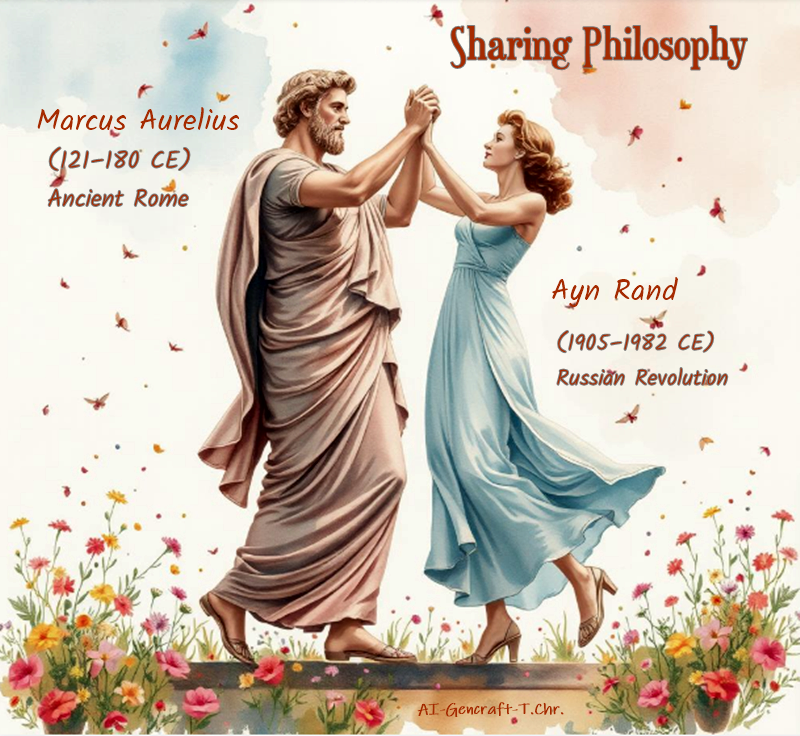A SHARED PHILOSOPHY

By AI-ChatGPT5-T.Chr.-Human Synthesis-19 August 2025
Blending Marcus Aurelius and Ayn Rand, 1700 years apart creates a fascinating philosophical hybrid — it’s like combining the stoic discipline of a Roman emperor with the radical individualism of a 20th-century novelist-philosopher.
The measure of a person is not in how much they possess, or the titles they carry, but in how faithfully they live within their own limits — and how fully they own their choices.
To be yourself — fully, honestly, without apology — is harder than it seems. Today, the world constantly pushes us to chase approval, mimic success, or overreach. Social media amplifies envy; the marketplace rewards excess; ambition is praised, but often without wisdom. Yet nothing is more corrosive than abandoning your own judgment for the sake of gain. True self-respect comes from recognizing your abilities, pursuing them rationally, and refusing to live by the expectations of others.
Doing your utmost does not mean doing more than you can sustain. It means committing every ounce of skill, every measure of energy, to what truly matters — without sacrificing your health, integrity, or peace of mind. Strength is not endless; wisdom lies in pacing effort, in knowing when enough is enough. Overcommitment may appear noble, but it often hides pride, fear, or the hunger for recognition.
Greed is a subtle enemy. It whispers that more is always better: more wealth, more influence, more accolades. Yet greed devours first the one who entertains it. True ambition is not the endless pursuit of what you do not need — it is the deliberate creation of value through your own effort. It is a pursuit guided by reason, not impulse. Excess is never a mark of greatness — only a shadow of imbalance.
Integrity is choosing sufficiency over excess. Balance over obsession. Substance over appearance. It is the quiet discipline of doing what is right, even when no one watches. It is rational self-interest in action: achieving what you can, respecting the freedom and abilities of others, and living by principles that do not contradict your nature. In a world where distractions are endless, where every platform magnifies noise and desire, such discipline is revolutionary.
Modern life offers countless temptations to overreach. The corporate ladder rewards relentless competition. Politics rewards spectacle over substance. Social media rewards appearances over authenticity. Yet those who burn themselves out in pursuit of “more” often find the world’s applause hollow, and their own hearts empty. True success is not a monument to greed, but a life fully lived within one’s capacity — a life of measured effort, meaningful contribution, and self-respect.
To live rightly is to contribute fully with all your ability, without pretending to carry what you cannot. It is to give your best without breaking yourself. It is to seek growth without being consumed by endless wanting. It is to act decisively, speak honestly, and rest when necessary — always aware that your limits are not weakness, but the boundaries within which true strength resides.
In the end, the greatest victories are often invisible. They are not celebrated with headlines or hashtags. They are found in the quiet mastery of self, in the ability to remain grounded amidst temptation, to act with courage without arrogance, and to preserve your humanity when the world demands compromise.
In a society that confuses greed with greatness, excess with success, and appearance with virtue, the true achievement is subtle but enduring:
To remain whole.
To remain balanced.
To remain yourself — rational, principled, and free.
1. Personal Responsibility and Rational Self-Interest:
- Marcus Aurelius: Emphasizes controlling your own mind, accepting what you cannot change, and acting virtuously regardless of external events.
- Ayn Rand: Stresses that individuals must pursue their own rational self-interest and take responsibility for their own life and happiness.
- Blend: You live life with deliberate rationality, accepting reality stoically, but actively pursuing your own values and ambitions. You’re accountable for your own flourishing, not bound by external approval or fate.
2. Virtue as Practical Excellence:
- Marcus Aurelius: Virtue is living according to reason, acting with justice, courage, temperance, and wisdom.
- Ayn Rand: Virtue is pursuing your rational values, achieving excellence, and creating the life you envision.
- Blend: Virtue is both ethical and practical — doing what is morally right in harmony with what actually sustains and elevates your life. Integrity becomes a blend of inner consistency and productive achievement.
3. Emotional Mastery and Self-Confidence:
- Marcus Aurelius: Train your mind to be indifferent to external events; maintain calm, focus, and resilience.
- Ayn Rand: Embrace your own mind, trust your judgment, and confidently act on your rational evaluation of reality.
- Blend: You cultivate inner serenity while boldly asserting your independence. You respond to life’s challenges without being crushed, yet without fear of pursuing your own path.
4. Society and Interaction:
- Marcus Aurelius: Humans are social animals; living virtuously contributes to the common good.
- Ayn Rand: Society exists to protect individual rights; cooperation is valuable when voluntary and mutually beneficial.
- Blend: Engage with society selectively, contributing where your values align, but never sacrificing your integrity or purpose to fit a collective expectation.
In short:
A “Marcus-Randian” philosophy would be a life of stoic self-mastery combined with uncompromising individualism. You live rationally, act with ethical excellence, pursue your ambitions confidently, and accept reality as it is — all while refusing to let external chaos dictate your inner state or derail your purpose.
